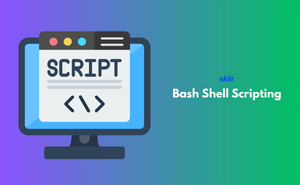👇 CELEBRATE CLOUD SECURITY DAY 👇
00
HOURS
00
MINUTES
00
SECONDS

Bash Shell Scripting refers to the process of writing and executing scripts in the Bash (Bourne Again Shell) language, which is a Unix shell and command language interpreter. It is used primarily for automating tasks and managing system configurations in Unix-based operating systems. Bash scripts are text files containing a series of commands and instructions that can be executed sequentially. They are commonly used for tasks such as file manipulation, text processing, and system administration. Bash scripting allows users to create powerful and flexible scripts to automate repetitive tasks, improve productivity, and streamline system management.
Why is Bash Shell Scripting important?
Who should take the Bash Shell Scripting Exam?
Bash Shell Scripting Certification Course Outline
Introduction to Bash Shell Scripting
Bash Scripting Basics
Flow Control in Bash
Functions and Modules
Text Processing with Bash
File Management
Error Handling and Debugging
Advanced Scripting Techniques
System Administration with Bash
Best Practices and Optimization
Integration with Other Tools
Industry-endorsed certificates to strengthen your career profile.
Start learning immediately with digital materials, no delays.
Practice until you’re fully confident, at no additional charge.
Study anytime, anywhere, on laptop, tablet, or smartphone.
Courses and practice exams developed by qualified professionals.
Support available round the clock whenever you need help.
Easy-to-follow content with practice exams and assessments.
Join a global community of professionals advancing their skills.
Bash scripting is a core skill for DevOps engineers. It is used for:
Bash scripting is used for:
After mastering Bash scripting, you can explore:
Yes, Bash scripting is widely used in cloud environments like AWS, Azure, and Google Cloud. It helps automate:
Bash scripting is widely used in:
No prior programming experience is required. Bash scripting is simpler than full programming languages like Python or Java. However, basic Linux command-line knowledge is recommended to understand how commands work.
Practice is the key. Hands-on scripting in real-world scenarios helps reinforce learning.
Yes, Bash scripting remains highly relevant in system administration, DevOps, and cloud computing. Even with new tools like Python, Ansible, and Kubernetes, Bash is still essential for:
Most Linux-based systems and cloud environments rely on Bash scripting for automation, making it a valuable and in-demand skill.
Salaries vary based on experience, job role, and location. However, the average annual salaries are:
Professionals with strong Bash scripting skills can earn higher salaries, especially if combined with cloud computing, automation, and cybersecurity expertise.
Bash shell scripting is a method of writing commands in a script file to automate tasks in Unix/Linux environments. It helps users automate repetitive tasks, process data, manage system configurations, and interact with remote servers. With Bash scripting, tasks that would take minutes or hours manually can be completed in seconds.
Bash scripting is an essential skill for professionals in IT, DevOps, system administration, and cloud computing. Job roles that require Bash scripting expertise include:
Many companies rely on Bash scripting for automating system tasks, configuring servers, managing security policies, and optimizing cloud deployments.